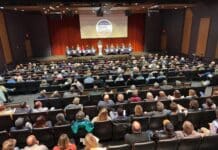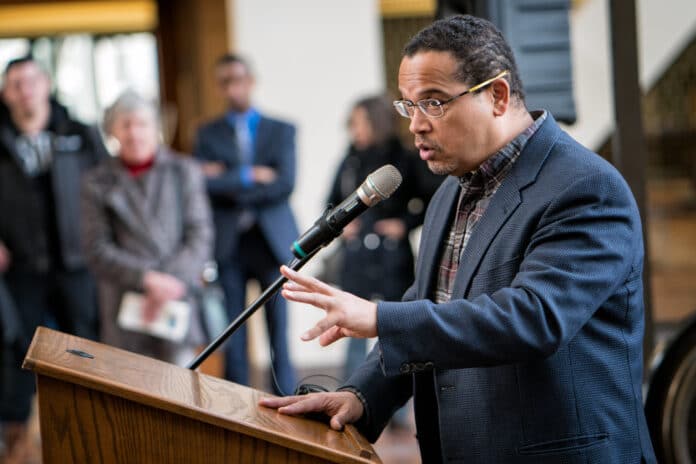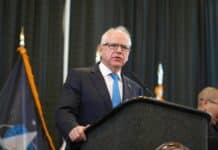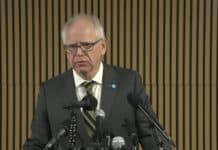In an effort to whip up more support from legislators in his own party — and perhaps a vote or two from across the political aisle — Attorney General Keith Ellison held a press conference Tuesday imploring bipartisan support for two controversial gun restriction bills with just six weeks left in the session.
While a number of gun control bills have been introduced at the Capitol in 2023, Democrats have narrowed their focus in the last few weeks on two: universal background checks and Extreme Risk Prevention Order (ERPO) legislation.
“We have six more weeks to get some good red flag laws in here,” Ellison said, as he and several members of gun control advocacy groups explained the time is now to pass legislative measures they say would go a long way toward eliminating gun violence, and particularly mass shootings and suicides.
“I dropped my grandson off at school this morning, and I am scared every day that he will not be safe in his school building, because guns will be entered into that building and could take his life or the life of his colleagues or his classmates or the life of his teachers,” said Sasha Cotton, a gun control advocate who led the city of Minneapolis Office of Violence Prevention from 2019 to 2022, when the number of homicides increased by nearly 69 percent during her tenure.
Ellison’s plea to legislators on Tuesday followed a press conference in March where he joined Gov. Tim Walz and former congresswoman Gabby Giffords to generate more publicity for the pair of gun control bills (SF1116 and SF1117), which currently have no support from Republicans and may have trouble gaining votes from Senate Democrats in vulnerable Greater Minnesota districts.
While the DFL holds a six-seat advantage in the House, it has 34 Democrats to 33 Republicans in the Senate, including two freshmen DFL senators from Greater Minnesota, in districts that could flip Republican in the next election cycle. Those legislators are Grant Hauschild, DFL-Hermantown, and Rob Kupec, DFL-Moorhead.
Both bills passed on party-line votes out of the Senate Judiciary and Public Safety Committee last month after more than three hours of public testimony and debate among senators. House versions of those bills were passed in a similar committee in February, also on party-line votes after hours of debate where members of the public had to obtain a ticket to attend in person. The outcome of such a vote on the Senate floor on the bills is not yet certain, according to those closest to the action.
Ellison says Bruen, Heller SCOTUS decision were ‘wrong’
While Ellison made a plea to Republicans and Greater Minnesota Democrats to support the ERPO and background check bills, he went out of his way to admit that he “vehemently” disagrees with two landmark federal Supreme Court decisions on Second Amendment rights, one of which came in 2021 and reasserted the right to carry a handgun out of the home.
“Is the Supreme Court wrong on Bruen? Yes. Were they wrong on Heller? Yes,” Ellison said. “Even those decisions leave enough space for the legislature to act now. We are asking for bipartisan support; right here and right now I am saying we need our Republican colleagues” to support the bills.
Republican senators and Second Amendment rights activists have repeated during hearings on each of the bills that they don’t intend to support either as both are constitutional overreach.
They say the universal background check bill would actually harm law-abiding citizens with overburdensome processes, such as requiring a permit for every back and forth private party transfer of handguns or rifles with certain attachments and giving local law enforcement the authority to mandate a 30-day waiting period for such transfers to take place. Rob Doar of the Minnesota Gun Owners Caucus has said the ERPO legislation includes several constitutionally problematic components, including the fact that the ERPO would be issued in an ex parte capacity, and would have a “chilling effect” on gun owners from seeking mental health resources.
Hank Long
Hank Long is a journalism and communications professional whose writing career includes coverage of the Minnesota legislature, city and county governments and the commercial real estate industry. Hank received his undergraduate degree at the University of Minnesota, where he studied journalism, and his law degree at the University of St. Thomas. The Minnesota native lives in the Twin Cities with his wife and four children. His dream is to be around when the Vikings win the Super Bowl.












